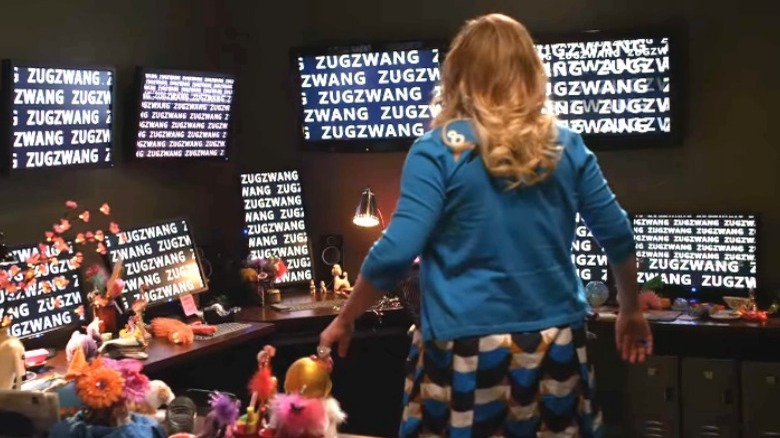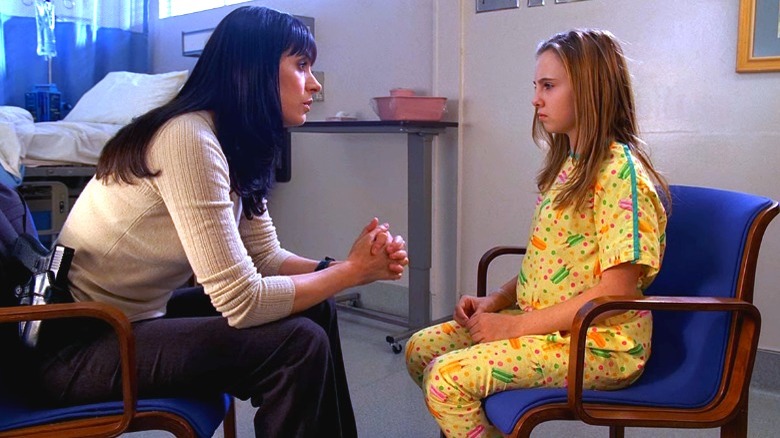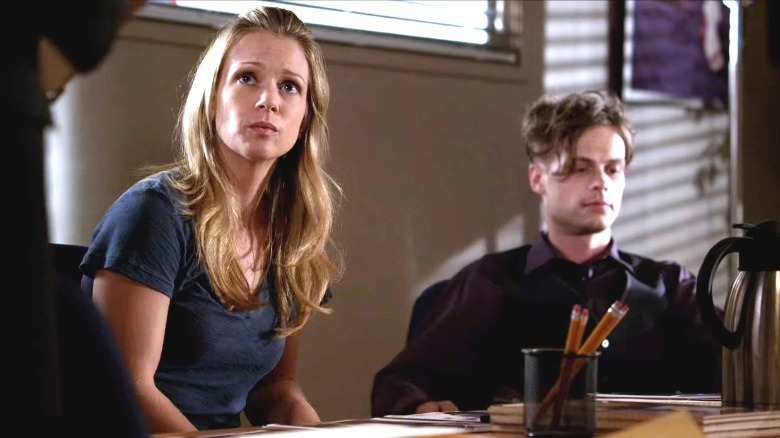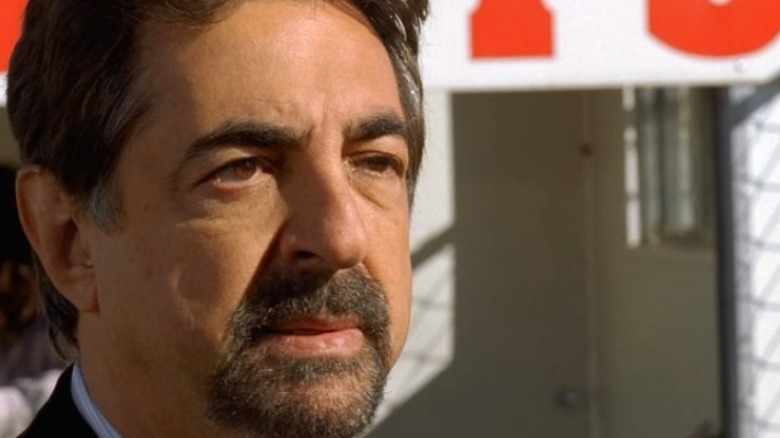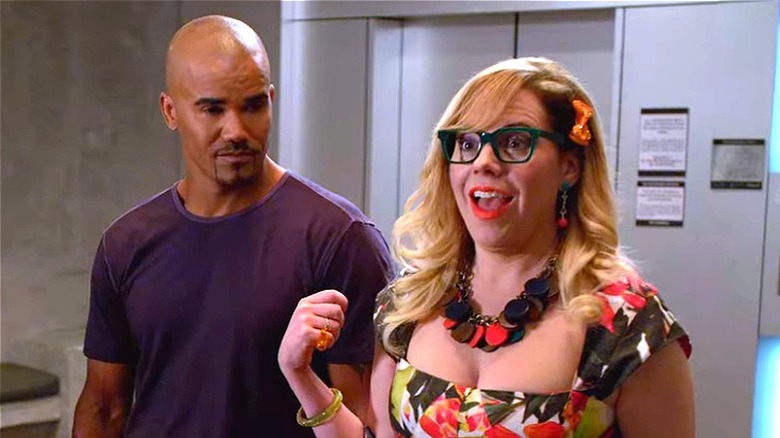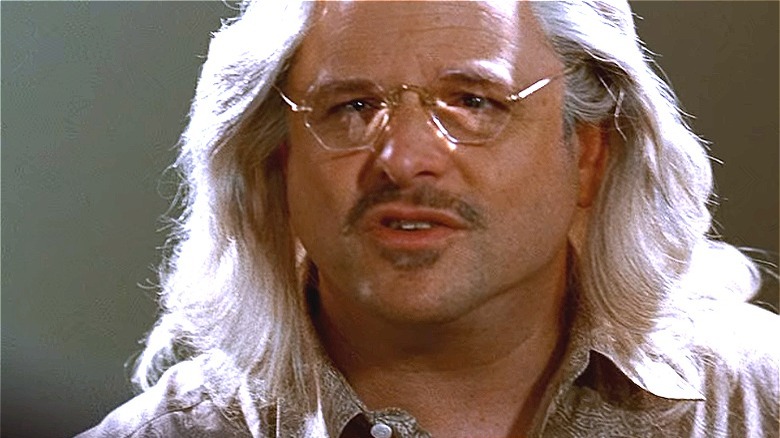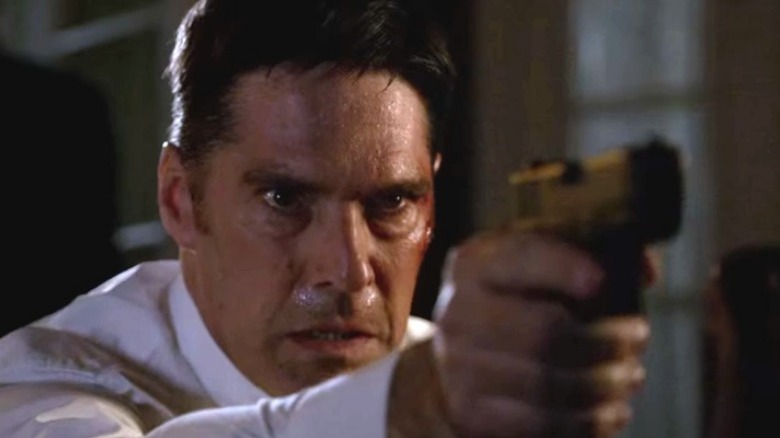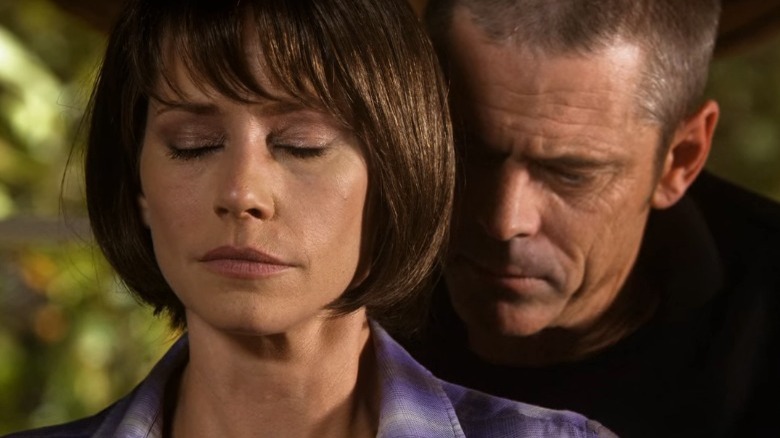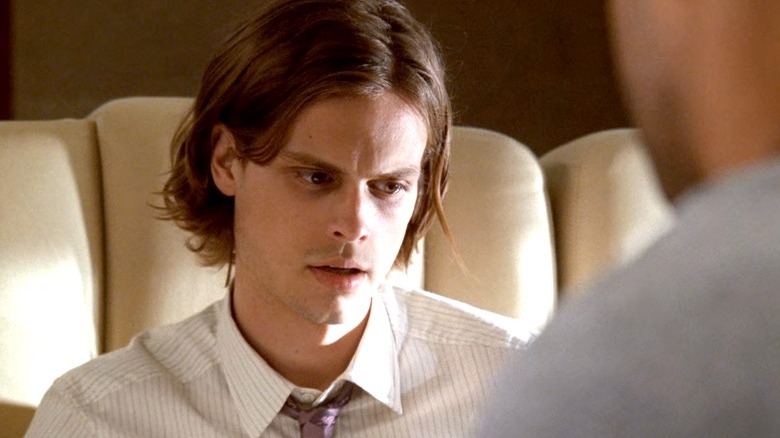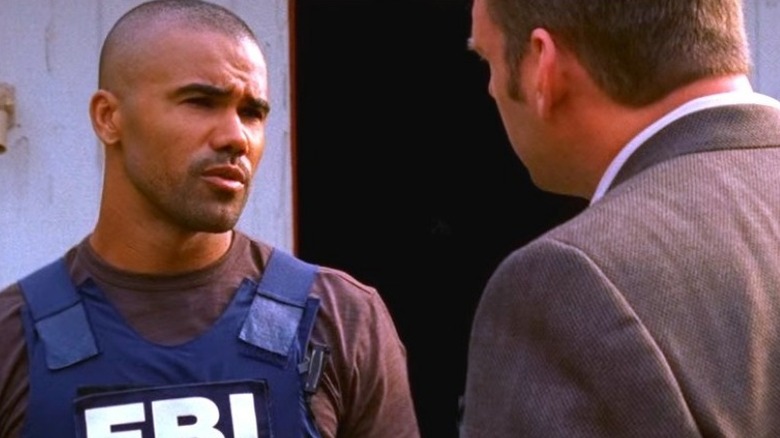Questionable Things We Ignore In Criminal Minds
In a world where police procedurals are a dime a dozen, there's just something about "Criminal Minds" that elevates it above the typical fare. With 15 seasons in as many years and a devoted fandom, the show, which ended in 2020, already has a rumored ten-episode revival that may or may not happen. Someone somewhere imagined a police procedural with bookend quotes, psychology, and Olive Garden commercial family vibes, and somehow, it just works.
But while most procedural dramas work hard to remain anchored in plausibility, "Criminal Minds" regularly and almost gleefully presses against the boundaries of disbelief, deftly integrating heavy-handed characterizations and spy-fi tropes alongside brooding crime drama conventions. Sometimes the show's more belief-defying elements serve a practical purpose as a plot shortcut. Other questionable details might help to add a lightness to the show's dark and disturbing content. And other times, the writers routinely throw the "Criminal Minds" cast into wacky storylines with human dolls and puppets for no other reason than because they can.
And yet, while plotlines involving evil geniuses and comically omniscient computer programs could easily doom any other procedural drama, for many "Criminal Minds" fans, they only add to its strange charm. In the spirit of our favorite autodidact Spencer Reid, we're taking a closer look at the details and exploring some of the more questionable things that, for better or worse, we overlook when watching "Criminal Minds." Let's deliver the profile.
Garcia's computer database is completely unrealistic
Technical analyst Penelope Garcia serves as a multi-purpose storytelling device, lightening the mood with her manic pixie-adjacent vibes while functioning as a deus ex machina, instantly narrowing down suspects and clues with her supercharged computer database. Rather than be bogged down with the FBI's limited system, Garcia, who was recruited to the BAU for her scarily good hacking skills, created her own Linux-based GUI and a database of databases, a handy piece of software that might best be described as Magic OS.
Garcia's program slickly slips in and out of just about any online database in the world from small-town phone records to bank, property, and tax records. Her searches also wantonly violate HIPAA, which she acknowledges openly in the episode "The Fox" while illegally obtaining a suspect's pharmaceutical records. But her program can also access all sorts of information that shouldn't even be available online, like who hired what contractor and for how long or whose mom has been having health problems. While some of it could be dug up with a whole lot of time and a social media deep dive, Garcia's able to instantly access everything through her database.
While in real life, illegally obtained information could result in a case getting thrown out, information warrants don't seem to be a concern. As the series continues, more liberty is taken with Garcia's seemingly magical searches. By Season 5, the search parameters seem to include employment records, detailed elementary school behavior records, dental records, and even past roommates. Need to find an unsub with poor dental hygiene and a quirky mug collection? No problem. Garcia's got you covered.
Hacking has seemingly no limits
Penelope Garcia isn't the only genius hacker on the series. Apparently, the serial killer world is rife with Bond villain-aspiring cyberwizards. We're introduced to our first in the pilot episode, "Extreme Aggressor," when serial killer accomplice Richard Slessman (D.J. Qualls) places a password-triggered virus on a computer hard drive at a crime scene.
The profiler team encounters a surprisingly high number of unsubs with advanced hacker skills, taking down more than a dozen over the course of the series. These superintelligent unsubs are able to accomplish impossible tasks with the click of a few keys and apparently unlimited resources, generally while working alone. In the "Fisher King" story arc, Randall Garner hacks into Garcia's computer by using an MMORPG character named Sir Kneighf as a trojan horse. This ploy grants Garner access to the entire FBI database and allows him to shut down Garcia's system, leaving only the repeated phrase "All Work No Play" splashed across her monitors.
And this wouldn't be the last time Garcia's system would be infiltrated. Reid's eventual nemesis John Curtis (a.k.a. The Replicator, played by Mark Hamill) takes a page from Garner's book, hacking into Garcia's system, and flooding her numerous screens with images of the team before replacing the pics with the word "Zugzwang."
Curtis eventually uses those supreme hacking skills to disable Reid and Blake's helicopter, causing them to crash. Not to be outdone, Oppenheimer fanboy Hayman Vasher would later hack and crash a commercial passenger jet with 151 passengers and crew. Unfortunately, while these extreme hacks were pretty implausible when they first aired, as serious cybercrimes become bolder and more commonplace in the real world, they may seem less farfetched to future viewers.
Cognitive interviews work like hypnosis
What do you do when your witness can't give you a clear description of the unsub? You do what any good profiler would and bust out a little spark of magic known as a cognitive interview! While it's true that cognitive interviews are a very real tool used by law enforcement professionals, in the context of the show, they work almost like magic to instantly hypnotize the interviewee, giving them perfect recall even for decades-old memories. The profiler will typically begin by asking an interview subject to imagine the sounds and smells during an event.
One Reddit user joked, "So now we're going to perform a cognitive interview and you'll suddenly remember the license plate number of the man that attacked you 30 years ago and it'll give us a huge break in the case."
In "Bloodline," Prentiss explains to her young interview subject, "It's as much about the things you sensed as the things you saw." After calming the young girl, Prentiss only has to ask, "What is the first thing you remember?" Her subject is instantly transported to the scene of an abduction. Sobbing, the child describes the abductor before crying, "It hurts! I don't want to be here! Someone's coming! Emily!"
In real life, cognitive interviews are more about gently jogging an interviewee's memory than giving them a virtual reality trauma trip.
There's a conspicuous lack of desk time
Let's face it — nobody wants to watch J.J., Spence, and Rossi hanging out at their desks making phone calls and filling out paperwork, so it makes sense that desk work gets trimmed from the storyline. But anyone who's seen "The First 48" knows that the bulk of crime-solving looks a lot more like Dilbert than Sherlock Holmes. And nobody cherished writing a good, old-fashioned FBI report better than Dana Scully.
In real life, the FBI analyst position is basically a desk job. Since this obviously wouldn't work for narrative purposes in the context of the show, Garcia's magical computer database cuts out the need for doing a lot of research and lets the team focus on getting out into the field.
Of all the BAU profilers, Reid gets the most desk time thanks to his Luddite tendencies, which often find him poring over stacks of old books. But even in our fictional version of the BAU, there are still reports to be written, a fact that gets mentioned from time to time.
And Hotchner can often be seen reading a report, so we know they exist. Since we never actually see anyone writing one, we'll just have to classify this as an X-file.
The BAU's questionable hiring practices
In the real world, getting hired at the BAU means making your way through loads of bureaucracy and red tape. But on "Criminal Minds," it seems just about anyone can end up working for the BAU. And in some cases, agents are hired right on the spot and put immediately into the field without having to fill out so much as a W-4.
Take Garcia, who was coerced into joining the team by Hotch. A Caltech dropout and self-taught hacker, Garcia was living off the grid when she was placed on an FBI hacker watch list. Apparently in need of a technical analyst and not yet familiar with LinkedIn, Hotchner brings her in for felony hacking of a cosmetics company ("The Black Queen") as a ruse to coerce her into working for the BAU. Hotch tells her, "I just need a resume to give to human resources. Or we prosecute you." One scented pink resume submission later, we end up with the sparklegoth tech queen we've all come to know and love.
Hotch doesn't even bother conducting multiple interviews to fill Kate's position after she leaves to focus on her family. Instead, he drags his first applicant Tara Lewis (Aisha Tyler), who's interrupted moments into her interview, into an investigation because he's short-handed, hiring her afterward.
With his sights set on a career in profiling, kid genius Spencer Reid Doogie Howsered his way into the FBI at age 20 before getting placed in the BAU at 22. In real life, the minimum hiring age for the FBI is 23, giving new hires a couple of buffer years for college partying.
Rossi is way past FBI retirement age
We love Rossi. There's just something about a guy who, despite becoming independently wealthy, chooses to keep fighting crime every day that strikes a patriotic chord. And if that wasn't enough to inspire a little red-white-and-bluespo, Rossi is a Vietnam vet with a Purple Heart. In his own words, "This job isn't just what I do, it's who I am. For every life we save? Damn right it's worth it."
The perfect mix of salty and sweet, Rossi brings unmatched experience and instinct to the BAU. But if it seems unlikely to you that the FBI would send someone well into their retirement years into raids, you're correct. When Rossi first rejoins the BAU after ten years spent in early retirement, he's still in his early 50s. But Rossi eventually manages to slip past the FBI's real-world mandatory retirement age of 57, not only continuing to work but also going out into the field well into his sixties.
In the immortal words of Outkast, "Age ain't nothin' but a number."
The BAU team seems fairly immune from legal consequences
In the world of "Criminal Minds," plot armor is about more than just bullet deflection and character death psych-outs. It also extends to near-complete immunity from any and all legal consequences. While warrants are often mentioned, whether they're needed seems to vary from one case to the next. At one point, Rossi even obtains a warrant to search an unsub's digestive tract. And yet other times, warrants seem to be optional or are quickly waved away with a comment about probable cause or the PATRIOT Act.
In real-life cases, sloppy warrant handling can easily sink a case, but this doesn't seem to be a problem in Hotch's BAU. The team is also fairly immune against far more serious legal consequences, a fact that would have frightening implications if true for the real-world FBI.
Elle Greenaway faces no legal repercussions after shooting a rapist, even if she faced professional fallout from Hotch. And it's not like Hotchner has any moral high ground to stand on considering he beat "Reaper" George Foyet (C. Thomas Howell) to death. Even Prentiss gets away with obstruction of justice when she destroys evidence and lies to local authorities while attempting to get Reid out of the slammer in Mexico. She also puts out a fake Amber Alert for Lindsey Vaughn in Season 12's "Red Light." Whatever it takes to get the job done!
Criminal Minds features some problematic portrayals of mental illness
If you learn only one thing from watching "Criminal Minds," it's that if you're suffering from mental illness, there's a solid chance you're going to turn into a stone-cold serial killer. For a show that's meant to focus on psychology, "Criminal Minds" frequently misses an opportunity to promote mental health awareness and work toward destigmatizing mental disorders. Instead, the series often draws on easy and often harmful stereotypes about mental illness that aren't always grounded in scientific fact.
In a 2019 statement, the APA emphasized that "only a very small percentage of violent acts are committed by people who are diagnosed with, or in treatment for, mental illness." Nonetheless, throughout the series, almost all of the offenders profiled suffer from severe mental illness even though mental health experts argue that characterizing mentally ill individuals as violent is overly simplistic, othering, and harmful.
To love "Criminal Minds" is to constantly overlook portrayals that probably won't stand up to scrutiny in the future, like the lovesick, obese PCOS sufferer whose depression led to her killing brides-to-be. From OCD and dissociative identity disorder to Munchausen and Stockholm Syndrome, if it exists, the series manages to twist it into a dark and depraved manifestation.
Although Spencer Reid's personal experiences with schizophrenia are meant to humanize the disorder, when stacked up against the many severely disturbed unsubs portrayed in the series, this tends to get washed out.
Garcia's inappropriate flirting
Penelope Garcia and Derek Morgan flirt back and forth constantly as a gesture of friendship that often serves to lighten the mood against a backdrop of death and darkness. Fans tend to fall into one of two camps on the Garcia-Morgan flirtation spectrum — either they love it and they find it absolutely delightful or they see it as inappropriate and cringey. But even if you fall into the first category, it's hard to believe that Garcia's comments would be allowed to pass for long in any professional environment, especially the FBI.
Although both Morgan and Garcia frequently exchange sexy banter, Garcia's language frequently crosses a line that would easily be seen as offensive or even threatening by a man. Her comments range from plausibly deniable (answering her phone, "Rainmaker. How wet do you want it?") to outright asking Morgan, "If I figure it out, does it earn me a night of passionate lovemaking?"
In Season 9, Morgan and Garcia do get called out in a Human Resources seminar with a PowerPoint explaining that sexual harassment can look like "a conversation between two coworkers" that involves phrases like "Baby Girl," "Chocolate Thunder," "more cushion for the pushin'," and "Where's my big black twelve-pack?"
Garcia's immediate response is embarrassment and frustration that someone blabbed, while Morgan is even less concerned, dismissing the event with a defiant, "So what? I am not about to change how I am with you because Bob in payroll doesn't get the joke."
Since write-ups for workplace behavior don't seem to be a thing at the BAU, after easing up for an episode or two, the besties basically blow the whole thing off and get right back to the babygirling.
Jason Alexander's performance on Criminal Minds
Of all the questionable things we're forced to overlook on "Criminal Minds," Jason Alexander's performance is one of the strangest. Even George Costanza's diehard fans found Alexander's performance puzzling at best.
In the 2008 episode "Masterpiece," we see Alexander playing a deranged professor in a performance that could best be described as "heavily overacted." But it's not just the acting with a capital A that makes this episode a real head-scratcher. It's also Alexander's look, crowned by a long, silvery wig that was absolutely glorious and ridiculous all at once.
One IMDB reviewer noted, "He looked like someone wearing a bad Halloween costume as Mark Twain. Horrible acting in all of the volley scenes between him and Rossi. Worst. Blech, I need a shower to scrub this episode off." From both an acting and hair and makeup perspective, the episode pairs nicely with Alexander's 1999 "Star Trek: Voyager" performance. Despite its many flaws, the episode garnered an 8.4 rating.
Nearly every episode ends in a dramatic standoff
One of the best things about procedurals is their predictability. From a writer's standpoint, it has to make putting together an episode a heckuva lot easier. And from a viewer's perspective, we get the comfort of knowing that by the end of an episode, we'll most likely get to see the story wrapped up and the killer put away.
For "Criminal Minds," a key part of that formula means nearly always coming in to save the last victim in the very nick of time, catching the unsub in media res. While this makes for great TV, it's not very realistic that the FBI would burst in at the last second and save a victim just as the unsub has decided to finish the deed.
In real life, serial killers are often apprehended doing pretty mundane activities. Ted Bundy, Randy Kraft, and Joel Rifkin were all caught while committing traffic violations. Investigators will often have suspects under surveillance for a long time before making an arrest and wait for an opportune time to apprehend them, as they did with David Berkowitz (Son of Sam). And John Wayne Gacy was under investigation so long that he developed a relationship with investigators, inviting them out for meals and drinks.
The BAU team is personally targeted way too often
It's hard to believe that anyone would stay working for the FBI if it meant their safety and the safety of those they love would constantly be at risk. After Hotch's wife and son are targeted by George Foyet and his wife is eventually killed, Hotch's commitment to his job seems stronger than ever. In Season 2, Reid is kidnapped, tortured, and fed drugs by religious zealot Tobias Hankel.
Garcia continues to work for the BAU after getting shot in Season 3, and is later placed under protective custody while she's targeted by a professional network of murderers-for-hire. Over the course of the series, every single member of the BAU (or their loved ones) winds up targeted by a serial killer.
Even more shocking, they're usually allowed to continue to work on cases they're connected to, sometimes after an easily dismissed comment about how they can't investigate their own case. And despite the fact that their loved ones are occasionally kidnapped and killed, they continue to work on the BAU team. Now that's job dedication.
The BAU team has a private jet
When you work for the BAU, you'd better have that go-bag ready at any given time, because most of their cases involve traveling across the country via the BAU's private jet. And the BAU seems to have bottomless resources to fund these flights of fancy. According to one of the producers, the BAU jet is a "point of contention" for the team's real-world counterparts, who do travel occasionally but always fly coach.
Not only does the BAU seem to have its own private jet available at a moment's notice, but there's always an available pilot on standby waiting to whisk them to some remote location. And apparently, Quantico has its own airport as Hotch will frequently end meetings with "Wheels up in 30" and in some cases, in 20 minutes. Is the tarmac right outside their office?
The BAU team leading raids
In the "Criminal Minds" world, the BAU team frequently storm active crime scenes right alongside SWAT teams. Not only do they participate in these raids, but they'll often lead them. While SWAT members are covered in head-to-toe body armor, our BAU team's plot armor and a little Kevlar offer sufficient protection.
In the real-world BAU, analysts never conduct raids or storm active crime scenes. According to True Crime Magazine, analysts are never in the line of fire and stay "out of life-threatening situations of any kind." In fact, the BAU tends to take a more secondary role in investigations across the board. According to retired Supervisory Special Agent Mark Hilts, locals remain in charge of a case when working with the BAU. In a 2011 FBI podcast, Hilts explained, "We are not dealing with what the front line detectives have to deal with, so we're kind of removed." While BAU agents help them solve the case, local police conduct arrests and do most of the crime-solving work. "They're the ones that are the true heroes and the true people in the front line," Hilts continued.
But when our favorite "Criminal Minds" characters have so much fun storming the castle, who can complain?


